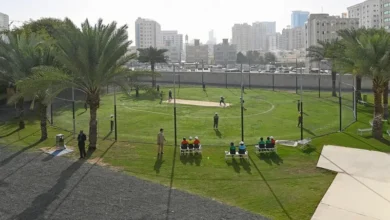Civil marriage, divorce: UAE Personal Status Law takes effect – all you need to know

The United Arab Emirates has taken a huge step forward for legal equality and protection for non-Muslim expats.
The Federal Personal Status Law (Federal Law No. 41 of 2022) came into effect on Wednesday, offering a comprehensive approach to crucial family matters such as marriage, child custody, divorce, and inheritance.
Al Arabiya English spoke to Maroun Abou Harb, a legal expert and associate at Dubai-based BSA Legal, about the significance of this new law and what it means for non-Muslim expats living in the UAE.
Civil marriage
The new law allows for foreign nationals to enter a civil marriage, subject to certain criteria such as age and mutual consent. The validity of the civil marriage must be confirmed by a judge.
Civil marriage is a type of marriage that is performed and recognized by the state or civil authorities, rather than by religious institutions. In a civil marriage, the couple is legally bound to each other by the laws of the state, and their union is recognized as a legally valid partnership.
Civil marriages are typically performed by a judge, justice of the peace, or other authorized government official. The requirements for getting married and the legal rights and obligations of the couple are determined by the state and are often subject to specific laws and regulations. Civil marriages are considered to be a secular alternative to religious marriages and are typically chosen by couples who do not wish to have a religious wedding or who come from different religious backgrounds.
“The spouses have to agree on the conditions of the contract, including the rights and obligations during the marriage period and post-divorce rights. The process of getting married involves completing a form prepared by the authentication judge and having it legalized by the same judge after all conditions and procedures have been met,” Abou Harb told Al Arabiya English.
“The contract shall be entered into the official register, while allowing a bilingual contract form for civil marriage.”
The fact that they will be recognized under the new law represents a significant shift because it was not previously recognized by the UAE under the old law, resulting in non-Muslim expats facing the possibility of having their assets subject to family court proceedings in the event of a contest divorce.
Divorce
“This new law expedited the divorce process in many ways by bypassing the referral to the family guidance committee,” the Dubai-based legal expert added.
“Non-Muslim expatriates can now enjoy greater legal protection and security when it comes to the division of assets in the event of a divorce.”
The law simplifies the divorce process by enabling either spouse to initiate proceedings without having to prove wrongdoing, and clearly outlines the rights and responsibilities of each party during and after the divorce.
“This newly issued law has a significant impact on the process of getting married. The requirement of attaining at least 21 years of age, obtaining written or verbal consent from both spouses, and disclosing any prior marital relationships have been established as necessary conditions for a civil marriage contract,” Abou Harb said.
Under the new law, both partners must reach a mutual agreement on the terms of their marriage contract, including their rights and obligations during the marriage and post-divorce.
In addition, it also allows either spouse to seek a divorce without the need to provide any evidence.
“The divorce process takes place through a court judgment at the first hearing, and a divorced woman may apply for alimony from her ex-husband through a separate application to the court. The acceptance of the alimony application and its conditions are determined by the judge, based on factors such as the number of years of marriage, the age and financial status of each spouse, and the extent of the husband’s contribution to the divorce,” Abou Harb explained.
“The law also takes into consideration the expenses of the mother’s custody of the children and the wife’s diligence in taking care of them. However, the wife’s alimony may be forfeited in the event of her remarriage or if her custody of the children ends.
“This change in law streamlines the process of getting divorced and gives more flexibility to the spouses seeking a separation.”
Child custody
The new Personal Status Law has also changed the principle of child custody by establishing shared custody between divorced parents are the “general principle” after their separation.
“This is to preserve the child’s psychological well-being and minimize the impact of the divorce on them. Unless either party submits an application to the court to grant custody to the parent who is better equipped to serve the child’s best interests or waives their right to custody,” Abou Harb said.
“In the event of a disagreement between the parents, either party may seek the intervention of the court to resolve the matter.
“The court has the discretion to make decisions that are in the best interests of the child.”
The long-term implications of these changes to the law have yet to be fully determined, but Abou Harb expects that they will lead to an increase in investment in the local economy.
“This is because non-Muslim expatriates are now able to move larger amounts of funds into the UAE with greater confidence, knowing that their assets are protected by the new legal framework,” he explained.
“It will be interesting to see how the courts interpret and apply these changes in the future. Nevertheless, this is a positive step forward for the protection of the rights of non-Muslim expatriates in the UAE and will likely lead to greater investment in the local economy.”
The move comes as the UAE continues to implement several reforms to enhance its appeal to expats. Since 2021, the country has introduced a number of flexible visa options, such as the prestigious Golden Visa, and just last month, eliminated alcohol tax, and implemented a mandatory unemployment insurance scheme.










